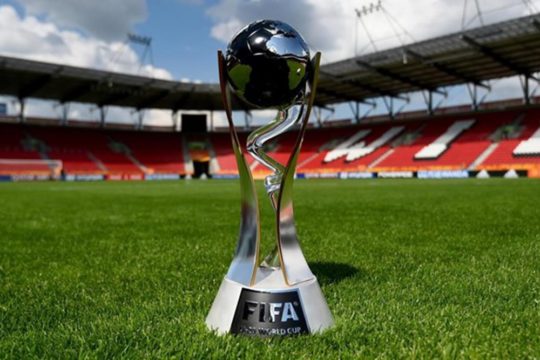Introduction
In a surprising turn of events, Argentina has been awarded the privilege of hosting the U-20 World Cup after FIFA stripped Indonesia of its hosting rights. The decision has sent shockwaves through the football community and raises questions about the reasons behind this sudden change. This article will delve into the background of the U-20 World Cup, the events that led to Indonesia losing the hosting rights, and what this means for the tournament and football in Argentina.
A Prestigious Tournament

The U-20 World Cup, also known as the FIFA U-20 World Cup, is a prestigious international football tournament that showcases the talents of young players from around the world. Since its inception in 1977, the competition has been a breeding ground for future football stars. Legends like Diego Maradona, Lionel Messi, and Cristiano Ronaldo have graced this tournament in their formative years. It provides a platform for emerging talents to shine on the global stage and is closely followed by scouts, managers, and football enthusiasts.
This tournament, organized by FIFA, is held every two years. The competition sees national teams from various continents vying for glory and attempting to prove their footballing prowess. The host nation plays a crucial role in ensuring the tournament’s success, from facilitating logistics to creating a vibrant atmosphere.
Indonesia’s Hosting Dreams Dashed
Indonesia had been eagerly anticipating the opportunity to host the U-20 World Cup. It would have marked the country’s debut as a host nation for a FIFA tournament. Indonesia had been preparing for the event for years, investing in infrastructure and facilities to ensure a memorable experience for players, officials, and spectators.
However, the dream was shattered when FIFA, the governing body of world football, decided to strip Indonesia of its hosting rights. The reasons for this decision have raised eyebrows and prompted speculation. There are several factors that may have contributed to this unprecedented move:
-
COVID-19 Concerns: The ongoing COVID-19 pandemic has posed significant challenges to the organization of major sporting events. FIFA could have been concerned about Indonesia’s ability to ensure the safety and health of players, officials, and fans during the tournament.
-
Infrastructure and Logistics: Preparations for hosting a tournament of this magnitude require extensive infrastructure development and logistical capabilities. FIFA might have deemed Indonesia’s progress in this regard inadequate.
-
Financial Stability: Hosting a major international tournament is an expensive endeavor. FIFA could have questioned Indonesia’s financial capacity to successfully organize the event without encountering financial difficulties.
-
Political and Organizational Issues: Political stability and sound governance are essential for hosting international tournaments. Issues related to these aspects might have contributed to FIFA’s decision.
The combination of these factors may have led FIFA to reconsider Indonesia’s suitability as a host nation. While FIFA’s decision is undoubtedly disappointing for Indonesia and its football fans, it has opened the door for Argentina to step in as the new host.
Argentina’s Rich Footballing Tradition

Argentina has a storied footballing history, and the nation’s passion for the sport is unrivaled. The country has produced some of the greatest footballers of all time, and it remains a football powerhouse. Hosting the U-20 World Cup is a significant honor for Argentina and an opportunity to showcase its footballing heritage.
The Argentine national team, led by legends like Diego Maradona and Lionel Messi, has won the senior FIFA World Cup twice and has consistently been a force in international football. Argentina’s ability to host a FIFA tournament is undeniable, as demonstrated by the country’s successful hosting of the 1978 World Cup and the 2001 FIFA U-20 World Cup.
Argentina’s footballing infrastructure and tradition are well-equipped to ensure the success of the U-20 World Cup. The country boasts top-class stadiums, passionate fans, and a rich football culture that will provide an ideal setting for the young stars of the future.
Impact on Argentine Football
The decision to host the U-20 World Cup is not only a matter of prestige for Argentina but also holds significant implications for the country’s football development. Hosting a FIFA tournament of this magnitude can have far-reaching effects on various aspects of the sport in Argentina:
-
Youth Development: The U-20 World Cup is a platform for young talents to showcase their abilities. With Argentina hosting the tournament, there will be added incentive for the nation’s youth to excel and earn a spot on the national team, following in the footsteps of Maradona, Messi, and others.
-
Infrastructure Investment: Preparations for hosting the tournament will likely result in investments in stadiums, training facilities, and infrastructure, which will benefit Argentine football in the long term.
-
Economic Boost: Hosting an international tournament can bring a significant economic boost to the host nation. Local businesses, hospitality, and tourism sectors are expected to benefit from the influx of fans and visitors.
-
Global Exposure: The U-20 World Cup will bring global attention to Argentina and its football culture. This exposure can attract international fans, sponsors, and partnerships.
-
Legacy for Future Tournaments: Successful hosting of the U-20 World Cup can open doors for Argentina to host more FIFA tournaments in the future, further solidifying its status as a footballing hub.
Challenges Ahead
While Argentina is undoubtedly capable of hosting the U-20 World Cup, challenges lie ahead. The time frame for preparations is relatively short, and the country will need to address logistical, organizational, and financial concerns to ensure a smooth and successful event.
One major challenge will be coordinating with FIFA and various stakeholders to finalize the tournament details, including match schedules, venues, and accommodations. Ensuring the safety of participants and fans will also be paramount, given the ongoing global health situation.
Financial aspects, including sponsorship deals, ticket sales, and revenue generation, will require careful planning to cover the costs of hosting the tournament. The government, local authorities, and football associations will need to collaborate effectively to make the event financially viable.
Conclusion
The decision to award Argentina the hosting rights for the U-20 World Cup following FIFA’s withdrawal of Indonesia as the host is a momentous one for Argentine football. It provides the country with an opportunity to demonstrate its footballing prowess and showcase its rich football culture to the world.
However, hosting a FIFA tournament comes with its share of challenges, from logistical concerns to financial considerations. Argentina will need to work diligently to ensure a successful event and make the most of the opportunities it presents for the country’s football development and economic growth.
As football enthusiasts eagerly await the U-20 World Cup on Argentine soil, the world will be watching to see how the country rises to the occasion and continues its legacy as a footballing powerhouse. The tournament promises to be a celebration of youth talent, football tradition, and the enduring spirit of the sport in Argentina.
Read all the Latest News, Trending News, football news, Sports News, and Live Football here. Follow us on Facebook, Twitter, and Instagram.



